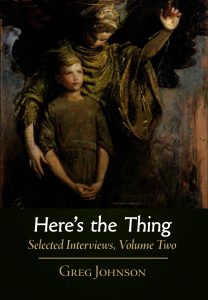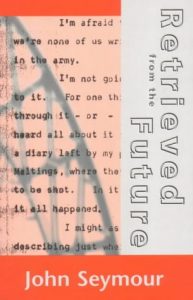John Seymour’s Retrieved From the Future
Posted By Steven Clark On In North American New Right | Comments DisabledJohn Seymour
Retrieved From the Future
London: New European Publications, 1996
John Seymour’s Retrieved From the Future depicts a Britain when the oil runs out, caused by the CRASH, when Shiites take over the Middle East and promptly destroy all its oil wells. An author of twenty-seven books, Seymour has a lifetime of experience inserted in this novel of survival and revolution. Living in the African bush, serving as an officer in the East African forces from Ethiopia to Burma, then a farmer in Suffolk, Wales, and Ireland, Seymour creates a credible world of farmers, soldiers, and townsmen. Retrieved is written from a different character’s viewpoint in each chapter — from Bob Hurlock, the hero of the story, to an English officer trying to maintain order, to Dike Randle, a Suffolk man who writes in dialect.
Without oil, there’s no food, and mass starvation takes over in the cities. The British government ceases to exist; or rather, the PM, royal family, et al give an encouraging radio speech, then vanish. Reports are that America, with its economy tied to trucking in goods over hundreds if not thousands of miles, is just as bad off. The yanks aren’t coming to the rescue. They can barely rescue themselves.
Governing is left to the army, who confiscates food, especially Bob Hurlock’s farm, whose livestock, wheat, and foodstuffs are more plentiful than the subsidized farms sucking on now nonexistent petrochemicals. It’s winter, and that makes death tolls in the cities skyrocket, an ominous offstage presence throughout the book.
Hurlock explains that England needs to switch to a peasant economy of small, independent farmers — the days of oil are over. With his natural farming practices, Hurlock was a local crank, but now he’s the most important man in Gretford. He refuses to give up his crops to confiscation, instead destroying them. He is promptly arrested along with Dike and several other locals who want no army running their lives.
With Hurlock’s family taken away and presumed dead, he escapes confinement and goes to war against the army, putting his military training and knowledge of the terrain to deadly effect. The army is more concerned with grabbing whatever oil they can find than winning hearts and minds (that is, the ones still alive). Hurlock and his guerrillas steal weapons, and bloody the army, which, after the CRASH, has become undisciplined and wedded to their heated barracks and mess halls; as well as scooping up local girls who want to eat.
Hurlock has a simple strategy. Pick the targets, hit when his men have the advantage, and then retreat:
I am convinced that determined guerrillas, in forest country, and — and this is the important thing — armed with automatic weapons with plenty of ammunition — will beat any regular troops. Automatic weapons give the ambusher such colossal hitting power . . . The man lying in wait has enormous advantage over the men moving on the road.
Seymour emphasizes that this war is almost Marxist in that it is a struggle between two interests: the city people — that is, the oil users — and the peasants. To Seymour, “peasant” is a noble term, denoting a class of self-sufficient folk who own their land and use it to produce food.
 [2]
[2]You can buy Greg Johnson’s Here’s the Thing here. [3]
It becomes a war for freedom, as told by Nightingale, an army officer who fights Hurlock but has doubts about his cause. As he put it, the British Isles had become nothing but an unsinkable aircraft carrier for the Americans (evoking Airstrip One), and the war against the food-gathering army by Hurlock and his men are denounced in terms that certainly resonate in the Brexit vote:
The army as they call themselves are no more the government of England than my cat. . . They’ve no more right in East Anglia than the Russians would have — or the Yanks did have. You people have allowed yourselves to be trodden on since William the Conquerer. You’ve . . . let those bastards in far too easily. We were all afraid of doing a bit of work, that was half the trouble. Just sit back and let “them” organize things. . . For two thousand years you’ve been refugees in your own country. First you’ve had the Normans — then the aristocrats and feudal barons — then the cotton manufacturers and their blasted pheasants — now you’ve got this lot. And you’re going to kick them out and own your own land for a change.
Throughout Retrieved From the Future, a populist voice of defiance is raised with a touch of Errol Flynn. The resisters, farmers, their wives, one of the lower gentry, and Dike Randle, in his rural dialect (“. . . But mark my words, guvnor-do Brown here take away the land and stock from the people what’s bin allotted he’ll rue the day. That on’t pay him! He’ll git an ash-plant a’top of his hid.”) speak in humble determination that’s enjoyable to read and imagine. “God,” you think to yourself, “is there anyone like this left in England?” When they form their own government of East Anglia, they complain and debate, but finally get down to planting crops, rigging sailing vessels, and beginning a world controlled by peasants. As Hurlock explains, peasants are not barbarians; a peasant is the opposite, and they need to create an intellectually and spiritually alive peasantry.
The new world brought in by small farmers and a very localized economy is painful.
People have to work, and work hard. Hurlock is careful not to be a dictator, for he argues that you really can’t have a dictatorship in an armed society. Life changes. The local church becomes the town’s social center as the Anglican priest’s protestations are put aside. After all, the church belongs to the people, and really, the Catholics have as much claim as the C of E since it was their church to begin with. Hurlock also sees an end to what he calls that dreadful academic education
. . . that stultified generations of children, kept them indoors when they should have been outdoors, bored them to death and rendered them quite unfit for any life except for becoming clerks or factory hands. Or, if they were very “bright” which is another way of saying had no imagination but encyclopaedic memories, turned them into perfectly useless “professionals” or, even worse, academics.
The book is not without its faults. It needed better editing, as some passages appear twice on the same page. One may quarrel about the voices of the communal narrators (Hurlock’s American wife sounds a tad un-American, or perhaps very East Coast), but his characters and dialogue are never dull, and it’s a very readable story with sympathetic characters. There are preachy sections, but they are woven into the story, and when told through the voices of Nightingale, Dike Randle, or Hurlock, are approachable. No long arias in Ayn Rand style. Whew.
Retrieved From the Future is dated only in that there is no mention of any racial conflict. An Indian doctor is the novel’s sole foreigner. Certainly, if the CRASH occured now, there would be an Islamic army ready to grab whatever food was to be had for the believers, and one quails at the thought of renegade bands of Jamaicans and Nigerians on the loose. But this novel is a delight to read, and setting its base in rural England makes you hope and cheer on Hurlock and his peasant army and his views, a modern-day Piers Plowman.
If you want to support Counter-Currents, please send us a donation by going to our Entropy page [4] and selecting “send paid chat.” Entropy allows you to donate any amount from $3 and up. All comments will be read and discussed in the next episode of Counter-Currents Radio, which airs every weekend on DLive [5].
Don’t forget to sign up [6] for the twice-monthly email Counter-Currents Newsletter for exclusive content, offers, and news.
